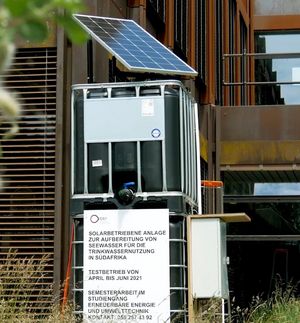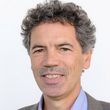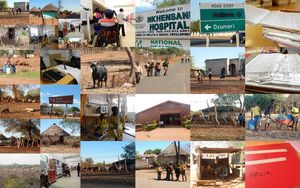Grantee Stories
Solar-Assisted Water Supply with GDM-Water-Treatment Technology
A Cooperation Between Universities of Applied Sciences in Switzerland and South Africa

The lack of universal access to electricity in many parts of Limpopo province makes it a goal of South Africa’s National Development plan (2011). Electricity supply has increased over the years, with the percentage of households connected growing from 76.7% in 2002 to 84.4% in 2017. Despite the increase, most rural parts face power rationing or lack electrification. Previous projects from the Eastern Switzerland University of Applied Sciences (OST) have invented and realized stand-alone solar systems, which provide electricity for Water Sanitation &Hygiene (WASH) facilities. Photovoltaic systems produce electricity from sunlight, making electricity reliable, decentralized and economical.
Additionally, WASH standards are often inadequate in predominantly low-income communities in rural areas of Limpopo. Water sources are at risk of faecal and wastewater pollution hence a significant source of contamination and spread of disease. Gravity driven membrane (GDM) technology purifies contaminated water at low cost without chemicals backwashing or energy supply.
Prof Michael Burkhardt und Prof Christof Biba together with a team of scientific employees and students are focused on water treatment systems supplied by renewable energy components. The activities were framed by the study programme “Renewable Energies and Environmental Engineering” and research work within the Institute for Solar technology and the Institute for Environmental Engineering.
We express our fervent appreciation to the Leading House Region Africa Seed Fund 2020 to enable us with this grant and ensure we see it through successfully. Through the fund, with a criteria catalogue from OST, we developed a compact solar driven water filtration plant, which is currently situated at the University of Venda (UNIVEN). Furthermore, initiating a partnership with UNIVEN and other institutions in South Africa and with Swiss TPH, ETH, and the University of Basel created a great possibility of bridging the knowledge gap between students, lecturers, and partners towards discovering a sustainable way of life in remote areas.
This grant enabled the development of solid synergies and networking collaborations between lecturers and students and with other institutions that received the Leading House Region Africa Seed Fund 2020. We improved knowledge and adaptation with the GDM-technology and solar-assisted water supply and energy in line with sustainability through training and workshops. Two OST students developed a transportable blueprint design of the system through their thesis work, later conducting a pilot construction and installation, and realized it in Switzerland. As a result, we were able to have a real-world experience of the overall concept, which we achieved by deploying a demonstration system to South Africa through a team from UNIVEN. However, the installation of the demonstration systems could have been successful, but we postponed the on-site installation at the specific location due to the Corona crisis. Eventually a Workshop at UNIVEN was held during a visit of two participants from OST.

“To this point, this study is an outstanding contribution to WASH activities and energy supply. Our findings could direct further research and are a building block for creating sustainable wash facilities and energy supply in remote areas with a dearth of electricity and inadequate WASH facilities, contributing to the Sustainable Development Goals. A cooperation between partners of different cultural, social and scientific background is very enriching and leads to insights that are valuable for both sides.”
Professor Christof Biba
Responsible for the photovoltaic activities within the study programme “Renewable Energies and Environmental Engineering” at Eastern Switzerland University of Applied Sciences Ost and the Institute for Solar Technology SPF
Climate Change and Cardiovascular Diseases: An Exploratory Study in Limpopo Province, South Africa

The rise in temperature trends globally due to climate change has been associated with increased mortality and is recognized as a risk factor for chronic illnesses such as cardiovascular diseases (CVDs). In South Africa, warming is happening at twice the global rate, calling for climate action to mitigate its impact, especially on health. The nationwide effects of temperature on CVD mortality have been studied. However, the effect of temperature on CVD morbidity in remote areas such as Limpopo has not yet been investigated. Limpopo harbours the highest levels of poverty in the country. With a population of 5.4 million inhabitants, 72.4% live in poverty. Moreover, only 4.2% of the households have air conditioning. Considering that Limpopo is one of the hottest areas in South Africa, the CVD risk in the province is very high and could exacerbate the CVD burden, which is a major public health concern.
Guéladio Cissé is the lead and coordinator of the project “Climate change and cardiovascular diseases: state and exploratory analyses of patient data in Limpopo province, South Africa”, financed by the Leading House Africa at Swiss TPH / University of Basel. The project took place in the framework of a scientific collaboration between the research group on “Ecosystem services, climate and health” of the Department of Epidemiology and Public Health at Swiss TPH, the Environment and Health Unit of the South African Medical Research Council (SAMRC) and the University of Johannesburg in South Africa (with Caradee Wright as co-applicant and co-principal investigator).
Cissé led in the past several studies on climate change and health, including in South Africa and is member of the Intergovernmental Panel on Climate Change (IPCC) Working Group II as a coordinating lead author.
Through Leading House Africa’s Seed Funding Research Grant on SDGs in Limpopo, the research organization, Swiss TPH, the University of Pretoria, and the South Africa Medical Research Council, among other partners, formed a collaborative environment to realize the findings of this study through a duration period of one year. In addition, Leading House enabled networking among the operational teams and organizations through sharing ideas geared towards a similar goal, and thus creating new opportunities and ideas that could take climate change and CVD research to a sustainable level.
An ecological study utilized health admission records from 2002-to 2016 in two public district hospitals-Nkhensani hospital and Maputha l. Malatjie Hospital, our study population, as individuals living in Limpopo province who had access to the two health facilities. We managed to work with a team in Switzerland composed of a PhD student (Shreya Shrikhande) and a Master degree student (Jacqueline Buehler) from Switzerland and a strong team in South Africa, starting with data collectors and scientists who assisted with digitizing the hospital admission records from 2002-to 2016. Moreover, we obtained daily mean ambient temperature (Tavrg), wind speed (WS) and relative humidity (RH) from the Thohoyandou weather station from 1. January 2002 until 31. December 2016 measured in degrees Celsius (°C), m/s and g/m3, respectively. In addition, we identified some discrepancies occurring at the facility level, individuals and the weather trends across the province that may be associated with the prevalence of CVDs in the region. For example, warm and specific cold apparent temperatures (12-24°C) have the potential to increase CVD admissions cumulated over 21 days, with cold temperatures being responsible for the most considerable fraction of CVD admissions. The study suggests further studies to strengthen these first findings, to identify vulnerable groups, and to improve public health through evidence-based mitigation strategies.
This grant gave an opportunity of enrolling two Master students, with one who completed her Master thesis in June 2021 on CVDs (Ms Jacqueline Biehler) and another one who pursued on respiratory illnesses (Mr Daniel Kipo) for a completion in 2022, mentored by a PhD student (Ms Shreya Schrikhende).

“Working together as a joint team from Switzerland and South Africa with regular meetings online kept progress on track. The collegiality between team members was very helpful and led to closer working relationships. This meant learning and sharing of skills was at its optimal. It was a very productive experience that strengthened the capacities of the younger researchers and opened doors for further collaboration between Switzerland and South Africa in the future.”
Professor Guéladio Cissé
Leader of the Ecosystem Services, Climate & Health Group at Swiss TPH